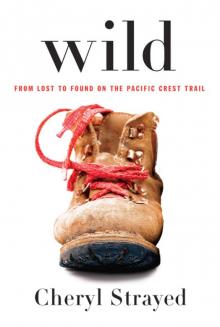- Home
- Cheryl Strayed
Wild: From Lost to Found on the Pacific Crest Trail Page 5
Wild: From Lost to Found on the Pacific Crest Trail Read online
Page 5
My mom had been dead three years.
When I said all the things I had to say, we both fell onto the floor and sobbed. The next day, Paul moved out. Slowly we told our friends that we were splitting up. We hoped we could work it out, we said. We were not necessarily going to get divorced. First, they were in disbelief—we’d seemed so happy, they all said. Next, they were mad—not at us, but at me. One of my dearest friends took the photograph of me she kept in a frame, ripped it in half, and mailed it to me. Another made out with Paul. When I was hurt and jealous about this, I was told by another friend that this was exactly what I deserved: a taste of my own medicine. I couldn’t rightfully disagree, but still my heart was broken. I lay alone on our futon feeling myself almost levitate from pain.
Three months into our separation, we were still in a torturous limbo. I wanted neither to get back together with Paul nor to get divorced. I wanted to be two people so I could do both. Paul was dating a smattering of women, but I was suddenly celibate. Now that I’d smashed up my marriage over sex, sex was the furthest thing from my mind.
“You need to get the hell out of Minneapolis,” said my friend Lisa during one of our late-night heartbreak conversations. “Come visit me in Portland,” she said.
Within the week, I quit my waitressing job, loaded up my truck, and drove west, traveling the same route I’d take exactly one year later on my way to hike the Pacific Crest Trail.
By the time I reached Montana, I knew I’d done the right thing—the wide green land visible for miles outside my windshield, the sky going on even farther. The city of Portland flickered beyond, out of sight. It would be my luscious escape, if only for a brief time. There, I’d leave my troubles behind, I thought.
Instead, I only found more.
3
HUNCHING IN A REMOTELY
UPRIGHT POSITION
When I woke the next morning in my room at White’s Motel, I showered and stood naked in front of the mirror, watching myself solemnly brush my teeth. I tried to feel something like excitement but came up only with a morose unease. Every now and then I could see myself—truly see myself—and a sentence would come to me, thundering like a god into my head, and as I saw myself then in front of that tarnished mirror what came was the woman with the hole in her heart. That was me. That was why I’d longed for a companion the night before. That was why I was here, naked in a motel, with this preposterous idea of hiking alone for three months on the PCT. I set my toothbrush down, then leaned into the mirror and stared into my own eyes. I could feel myself disintegrating inside myself like a past-bloom flower in the wind. Every time I moved a muscle, another petal of me blew away. Please, I thought. Please.
I went to the bed and looked at my hiking outfit. I’d laid it out carefully on the bed before I’d gotten into the shower, the way my mom had done for me when I was a child on the first day of school. When I put on my bra and T-shirt, the tiny scabs that still rimmed my new tattoo caught on the shirt’s sleeve and I delicately picked at them. It was my only tattoo—a blue horse on my left deltoid. Paul had one to match. We’d had them done together in honor of our divorce, which had become final only the month before. We weren’t married anymore, but the tattoos seemed proof to us of our everlasting bond.
I wanted to call Paul even more desperately than I had the previous night, but I couldn’t let myself. He knew me too well. He’d hear the sorrow and hesitation in my voice and discern that it was not only that I felt anxious about beginning on the PCT. He’d sense that I had something to tell.
I put my socks on and laced up my boots, went to the window, and pushed the curtain back. The sun was blinding against the white stones of the parking lot. There was a gas station across the way—a good place to hitch a ride to the PCT, I supposed. When I let go of the curtain, the room went dark again. I liked it that way, like a safe cocoon that I’d never have to leave, though I knew I was wrong. It was nine in the morning and already hot outside, the vented white box in the corner come alive with its breezy roar. In spite of everything that implied I was going nowhere, I had someplace to be: it was day 1 on the PCT.
I opened the compartments of my pack and pulled everything out, tossing each item onto the bed. I lifted the plastic bags and emptied them too, then stared at the pile of things. It was everything I had to carry for the next three months.
There was a blue compression sack that held the clothes I wasn’t already wearing—a pair of fleece pants, a long-sleeved thermal shirt, a thick fleece anorak with a hood, two pair of wool socks and two pair of underwear, a thin pair of gloves, a sun hat, a fleece hat, and rain pants—and another, sturdier sack called a dry bag, packed to the gills with all the food I’d need over the next fourteen days, before I reached my first resupply stop at a place called Kennedy Meadows. There was a sleeping bag and a camp chair that could be unclipped to use as a sleeping pad and a headlamp like the kind miners wear and five bungee cords. There was a water purifier and a tiny collapsible stove, a tall aluminum canister of gas, and a little pink lighter. There was a small cooking pot nested inside a larger cooking pot and utensils that folded in half and a cheap pair of sports sandals I intended to wear in camp at the end of each day. There was a quick-dry pack towel, a thermometer keychain, a tarp, and an insulated plastic mug with a handle. There was a snakebite kit and a Swiss army knife, a miniature pair of binoculars in a fake leather zip-up case and a coil of fluorescent-colored rope, a compass I hadn’t yet learned how to use and a book that would teach me how to use the compass called Staying Found that I had intended to read on the plane to LA, but hadn’t. There was a first aid kit in a pristine red canvas case that snapped shut and a roll of toilet paper in a ziplock bag and a stainless-steel trowel that had its own black sheath that said U-Dig-It on the front. There was a small bag of toiletries and personal items I thought I’d need along the way—shampoo and conditioner, soap and lotion and deodorant, nail clippers and insect repellent and sunscreen, a hairbrush and a natural menstrual sponge, and a tube of waterproof sunblock lip balm. There was a flashlight and a metal candle lantern with a votive candle inside and an extra candle and a foldable saw—for what, I did not know—and a green nylon bag with my tent inside. There were two 32-ounce plastic water bottles and a dromedary bag capable of holding 2.6 gallons of water and a nylon fist that unfurled into a rain cover for my backpack and a Gore-Tex ball that opened up to become my raincoat. There were things I brought in case the other things I brought failed—extra batteries, a box of waterproof matches, a Mylar blanket, and a bottle of iodine pills. There were two pens and three books in addition to Staying Found: The Pacific Crest Trail, Volume 1: California (the very guidebook that had set me off on this journey, written by a quartet of authors who spoke in one calm but stern voice about the rigors and rewards of the trail), William Faulkner’s As I Lay Dying, and Adrienne Rich’s The Dream of a Common Language. There was an eight-by-eleven two-hundred-page hardback sketchbook that I used as a journal and a ziplock bag with my driver’s license inside and a small wad of cash, a sheaf of postage stamps, and a tiny spiral notebook with the addresses of friends scrawled on a few pages. There was a full-sized, professional-quality 35-millimeter Minolta X-700 camera with a separate attachable zoom lens and another separate attachable flash and a tiny collapsible tripod, all of which was packed inside a padded camera case the size of a football.
Not that I was a photographer.
I’d gone to an outdoor store in Minneapolis called REI about a dozen times over the previous months to purchase a good portion of these items. Seldom was this a straightforward affair. To buy even a water bottle without first thoroughly considering the latest water bottle technology was folly, I quickly learned. There were the pros and cons of various materials to take into account, not to mention the research that had been done regarding design. And this was only the smallest, least complex of the purchases I had to make. The rest of the gear I would need was ever more complex, I realized after consulting with the men and women of REI, who
inquired hopefully if they could help me whenever they spotted me before displays of ultralight stoves or strolling among the tents. These employees ranged in age and manner and area of wilderness adventure proclivity, but what they had in common was that every last one of them could talk about gear, with interest and nuance, for a length of time that was so dumbfounding that I was ultimately bedazzled by it. They cared if my sleeping bag had snag-free zipper guards and a face muff that allowed the hood to be cinched snug without obstructing my breathing. They took pleasure in the fact that my water purifier had a pleated glass-fiber element for increased surface area. And their knowledge had a way of rubbing off on me. By the time I made the decision about which backpack to purchase—a top-of-the-line Gregory hybrid external frame that claimed to have the balance and agility of an internal—I felt as if I’d become a backpacking expert.
It was only as I stood gazing at that pile of meticulously chosen gear on the bed in my Mojave motel room that I knew with profound humility that I was not.
I worked my way through the mountain of things, wedging and cramming and forcing them into every available space of my pack until nothing more could possibly fit. I had planned to use the bungee cords to attach my food bag, tent, tarp, clothing sack, and camp chair that doubled as a sleeping pad to the outside of my pack—in the places on the external frame meant for that purpose—but now it was apparent that there were other things that would have to go on the outside too. I pulled the bungee cords around all the things I’d planned to and then looped a few extra things through them as well: the straps of my sandals and the camera case and the handles of the insulated mug and the candle lantern. I clipped the metal trowel in its U-Dig-It sheath to my backpack’s belt and attached the keychain that was a thermometer to one of my pack’s zippers.
When I was done, I sat on the floor, sweaty from my exertions, and stared peaceably at my pack. And then I remembered one last thing: water.
I’d chosen to begin my hike where I had simply because from there I estimated it would take me about a hundred days to walk to Ashland, Oregon—the place I’d originally planned to end my hike because I’d heard good things about the town and thought I might like to stay there to live. Months ago, I’d traced my finger southward down the map, adding up the miles and the days, and stopped at Tehachapi Pass, where the PCT crosses Highway 58 in the northwest corner of the Mojave Desert, not far from the town of Mojave. What I hadn’t realized until a couple of weeks before was that I was beginning my hike on one of the driest sections of the trail, a section where even the fastest, fittest, and most seasoned hikers couldn’t always get from one water source to another each day. For me, it would be impossible. It would take me two days to reach the first water source seventeen miles into my hike, I guessed, so I would have to carry enough to get me through.
I filled my 32-ounce bottles in the bathroom sink and put them in my pack’s mesh side pockets. I dug out my dromedary bag from the place I’d crammed it in my pack’s main compartment and filled up all 2.6 gallons of it. Water, I later learned, weighs 8.3 pounds a gallon. I don’t know how much my pack weighed on that first day, but I do know the water alone was 24.5 pounds. And it was an unwieldy 24.5 pounds. The dromedary bag was like a giant flattish water balloon, sloshing and buckling and slipping out of my hands and flipping itself onto the floor as I attempted to secure it to my pack. The bag was rimmed with webbing straps; with great effort I wove the bungee cords through them, next to the camera bag and sandals and the insulated cup and candle lantern, until I grew so frustrated that I pulled out the insulated cup and threw it across the room.
Finally, when everything I was going to carry was in the place that I needed to carry it, a hush came over me. I was ready to begin. I put on my watch, looped my sunglasses around my neck by their pink neoprene holder, donned my hat, and looked at my pack. It was at once enormous and compact, mildly adorable and intimidatingly self-contained. It had an animate quality; in its company, I didn’t feel entirely alone. Standing, it came up to my waist. I gripped it and bent to lift it.
It wouldn’t budge.
I squatted and grasped its frame more robustly and tried to lift it again. Again it did not move. Not even an inch. I tried to lift it with both hands, with my legs braced beneath me, while attempting to wrap it in a bear hug, with all of my breath and my might and my will, with everything in me. And still it would not come. It was exactly like attempting to lift a Volkswagen Beetle. It looked so cute, so ready to be lifted—and yet it was impossible to do.
I sat down on the floor beside it and pondered my situation. How could I carry a backpack more than a thousand miles over rugged mountains and waterless deserts if I couldn’t even budge it an inch in an air-conditioned motel room? The notion was preposterous and yet I had to lift that pack. It hadn’t occurred to me that I wouldn’t be able to. I’d simply thought that if I added up all the things I needed in order to go backpacking, it would equal a weight that I could carry. The people at REI, it was true, had mentioned weight rather often in their soliloquies, but I hadn’t paid much attention. It seemed there had been more important questions to consider. Like whether a face muff allowed the hood to be cinched snug without obstructing my breathing.
I thought about what I might take out of my pack, but each item struck me as either so obviously needed or so in-case-of-emergency necessary that I didn’t dare remove it. I would have to try to carry the pack as it was.
I scooted over the carpet and situated myself on my rump right in front of my pack, wove my arms through the shoulder straps, and clipped the sternum strap across my chest. I took a deep breath and began rocking back and forth to gain momentum, until finally I hurled myself forward with everything in me and got myself onto my hands and knees. My backpack was no longer on the floor. It was officially attached to me. It still seemed like a Volkswagen Beetle, only now it seemed like a Volkswagen Beetle that was parked on my back. I stayed there for a few moments, trying to get my balance. Slowly, I worked my feet beneath me while simultaneously scaling the metal cooling unit with my hands until I was vertical enough that I could do a dead lift. The frame of the pack squeaked as I rose, it too straining from the tremendous weight. By the time I was standing—which is to say, hunching in a remotely upright position—I was holding the vented metal panel that I’d accidentally ripped loose from the cooling unit in my efforts.
I couldn’t even begin to reattach it. The place it needed to go was only inches out of my reach, but those inches were entirely out of the question. I propped the panel against the wall, buckled my hip belt, and staggered and swayed around the room, my center of gravity pulled in any direction I so much as leaned. The weight dug painfully into the tops of my shoulders, so I cinched my hip belt tighter and tighter still, trying to balance the burden, squeezing my middle so tightly that my flesh ballooned out on either side. My pack rose up like a mantle behind me, towering several inches above my head, and gripped me like a vise all the way down to my tailbone. It felt pretty awful, and yet perhaps this was how it felt to be a backpacker.
I didn’t know.
I only knew that it was time to go, so I opened the door and stepped into the light.
PART TWO
TRACKS
The words are purposes.
The words are maps.
ADRIENNE RICH,
“Diving into the Wreck”
Will you take me as I am?
Will you?
JONI MITCHELL,
“California”
4
THE PACIFIC CREST TRAIL, VOLUME 1: CALIFORNIA
I’d done a lot of dumb and dangerous things in my life, but soliciting a ride with a stranger was not yet one of them. Horrible things happened to hitchhikers, I knew, especially to women hitchhiking alone. They were raped and decapitated. Tortured and left for dead. But as I made my way from White’s Motel to the nearby gas station, I could not allow such thoughts to distract me. Unless I wanted to walk twelve miles along the broiling shoulder
of the highway to reach the trail, I needed a ride.
Plus, hitchhiking was simply what PCT hikers did on occasion. And I was a PCT hiker, right? Right?
Right.
The Pacific Crest Trail, Volume 1: California had explained the process with its usual equanimity. On some occasions the PCT would cross a road and miles down that road would be the post office where one would have mailed the box of food and supplies needed on the next section of the trail. Hitchhiking was the only practical solution when it came to fetching those boxes and returning to the trail.
I stood near the soda machines up against the gas station building, watching people come and go, trying to work up the nerve to approach one of them, hoping I’d sense that I was safe from harm when I saw the right person. I watched old desert-grizzled men in cowboy hats and families whose cars were full already and teenagers who pulled up with music blasting out their open windows. Nobody in particular looked like a murderer or rapist, but nobody in particular didn’t look like one either. I bought a can of Coke and drank it with a casual air that belied the fact that I could not stand up properly because of the unbelievable weight on my back. Finally, I had to make a move. It was nearly eleven, pitching steadily into the heat of a June day in the desert.
A minivan with Colorado plates pulled up and two men got out. One man was about my age, the other looked to be in his fifties. I approached them and asked for a ride. They hesitated and glanced at each other, their expressions making it apparent that they were united in their silent search for a reason to say no, so I kept talking, explaining in quick bursts about the PCT.

 Wild: From Lost to Found on the Pacific Crest Trail
Wild: From Lost to Found on the Pacific Crest Trail This Telling (Out of Line collection)
This Telling (Out of Line collection) Tiny Beautiful Things: Advice on Love and Life From Dear Sugar
Tiny Beautiful Things: Advice on Love and Life From Dear Sugar Tiny Beautiful Things
Tiny Beautiful Things